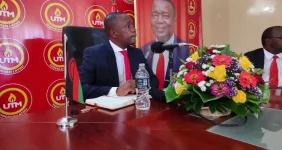Malawi's Election Race Takes Shape as Three Leaders Vie for Presidency.
Three men—Dalitso Kabambe, Lazarus Chakwera, and Peter Mutharika—are leading the race for Malawi's presidency ahead of the September 2025 elections.
Kabambe heads UTM after taking over from Saulos Chilima, who died in office. Critics say he lacks the political base needed for victory. His party claims few seats in parliament and relies heavily on social media presence.
President Chakwera enters as the incumbent with state resources at his command. He holds strong support in Malawi's Central Region. The Southern Region vote appears split between Mutharika, Kabambe, and Kondwani Nankhumwa.
Political analysts point to tribal and regional voting as key factors. The ruling Malawi Congress Party draws power from the center and the Democratic Progressive Party from the south. UTM lacks such a clear base.
Experience marks another divide. Veterans see Kabambe as new to politics despite his civil service background. Some urged him to partner with former president Mutharika rather than run alone.
The race recalls past lessons. Chilima left Mutharika's party in 2019 to join Chakwera. He later died in a plane crash under Chakwera's government, raising questions about political alliances.
Experts note that voters care about more than skills. In 1994, Bakili Muluzi won against doctor Hastings Banda despite having less education. Recent party votes showed similar patterns—academic credentials didn't guarantee victory.
The election's outcome remains uncertain. UTM must build local support beyond social media. Regional loyalties and strategic alliances may decide who leads Malawi next year.
Three men—Dalitso Kabambe, Lazarus Chakwera, and Peter Mutharika—are leading the race for Malawi's presidency ahead of the September 2025 elections.
Kabambe heads UTM after taking over from Saulos Chilima, who died in office. Critics say he lacks the political base needed for victory. His party claims few seats in parliament and relies heavily on social media presence.
President Chakwera enters as the incumbent with state resources at his command. He holds strong support in Malawi's Central Region. The Southern Region vote appears split between Mutharika, Kabambe, and Kondwani Nankhumwa.
Political analysts point to tribal and regional voting as key factors. The ruling Malawi Congress Party draws power from the center and the Democratic Progressive Party from the south. UTM lacks such a clear base.
Experience marks another divide. Veterans see Kabambe as new to politics despite his civil service background. Some urged him to partner with former president Mutharika rather than run alone.
The race recalls past lessons. Chilima left Mutharika's party in 2019 to join Chakwera. He later died in a plane crash under Chakwera's government, raising questions about political alliances.
Experts note that voters care about more than skills. In 1994, Bakili Muluzi won against doctor Hastings Banda despite having less education. Recent party votes showed similar patterns—academic credentials didn't guarantee victory.
The election's outcome remains uncertain. UTM must build local support beyond social media. Regional loyalties and strategic alliances may decide who leads Malawi next year.












